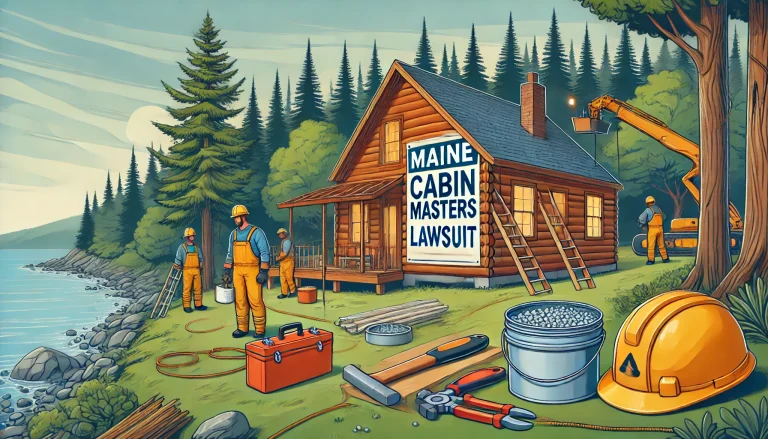“Maine Cabin Masters” is a popular TV show that features a talented team of builders renovating cabins in the beautiful state of Maine. The show, which airs on the DIY Network, follows Kennebec Property Services LLC, the company responsible for carrying out these renovations. Viewers love the show for its charm, and the work done on these cabins often inspires many homeowners to take on their own renovation projects.
However, in 2022, the Maine Cabin Masters lawsuit filed by the U.S. Environmental Protection Agency (EPA) brought the show into legal scrutiny. The lawsuit stemmed from violations related to lead safety during renovation work. In this article, we will break down what happened, the importance of the regulations, and how the case was resolved.
Background of the Lawsuit
The heart of the lawsuit centers on a federal rule designed to protect people from lead exposure during home renovations. The rule is known as the Lead Renovation, Repair, and Painting (RRP) Rule, which requires contractors to follow strict guidelines when working on homes that were built before 1978. Homes built before this year often contain lead-based paint, which can be dangerous if disturbed during renovation.
Kennebec Property Services LLC, the company featured on “Maine Cabin Masters,” was accused by the EPA of failing to comply with these regulations during renovations on several homes. The issue was serious because improper handling of lead-based paint could put both workers and homeowners at risk of lead exposure, which can have devastating health effects, particularly on young children.
Understanding the Maine Cabin Masters Lawsuit: What Happened and Why It Matters
The Maine Cabin Masters lawsuit brought attention to the importance of lead safety during home renovations. Filed by the U.S. Environmental Protection Agency (EPA), the lawsuit alleged that Kennebec Property Services LLC, the company featured in the popular TV show, failed to follow federal safety regulations while renovating older homes. These regulations, known as the Lead Renovation, Repair, and Painting (RRP) Rule, are designed to protect people, especially children, from the dangers of lead exposure.
The case centered on the renovation of five properties built before 1978, which likely contained lead-based paint. The company faced accusations of not renewing their lead-safe certification, failing to assign certified renovators to projects, neglecting to provide homeowners with essential safety pamphlets, and inadequate record-keeping. These lapses posed health risks to workers and homeowners, as lead exposure can lead to developmental delays, reduced IQ, and behavioral issues in children, as well as other serious health problems for adults.
Through a settlement, the company paid a $16,500 penalty and committed to improving its practices. The show also agreed to use its platform to educate viewers about lead safety, ensuring that such risks are minimized in future renovation projects. This case serves as a reminder of the importance of following safety guidelines and maintaining accountability in the home renovation industry.
Key Allegations by the EPA
The EPA’s allegations against Kennebec Property Services LLC were focused on several key violations related to the RRP Rule. Let’s take a closer look at these accusations:
Failure to Renew Certification
- The RRP Rule requires that all contractors involved in renovations of older homes must be certified in lead-safe practices. In this case, the EPA alleged that Kennebec Property Services LLC did not renew its certification before working on certain properties. Without proper certification, the company was not legally allowed to perform renovations that might disturb lead-based paint.
Noncompliance with Federal Safety Standards
- In addition to failing to renew certification, the company was accused of not assigning a certified renovator to supervise the work. The RRP Rule mandates that a certified renovator must be on-site during the renovation to ensure that all safety procedures are followed to prevent lead contamination.
- Another violation involved the failure to provide property owners with the necessary lead hazard information pamphlet. This pamphlet is required by the RRP Rule and informs homeowners about the risks of lead exposure and the necessary precautions that must be taken during renovations.
Inadequate Record-Keeping
- Contractors are also required to keep records of the work done, especially in cases where lead-based paint is involved. The EPA’s lawsuit claimed that Kennebec Property Services LLC failed to maintain the proper documentation to demonstrate that they were following the required safety measures.
Properties Involved
The lawsuit specifically focused on renovations that took place at five different properties. All of these homes were built before 1978, which means they were more likely to contain lead-based paint. Disturbing this paint during renovations without proper safety measures can release dangerous lead dust into the environment, putting everyone in the area at risk of exposure.
The properties involved were not only in need of renovation but also required special attention due to the potential presence of lead-based paint. This makes it crucial that proper procedures be followed to minimize the risk of contamination.
Health Risks of Lead Exposure
Understanding why these regulations are so important requires looking at the risks of lead exposure. Lead is a toxic substance that can have serious health effects, especially on young children. Some of the health risks associated with lead exposure include:
- Developmental Delays: Children exposed to lead may experience developmental delays, particularly in their cognitive and motor skills.
- Reduced IQ: Lead exposure has been linked to a decrease in IQ levels in children.
- Behavioral Problems: Lead poisoning can also cause behavioral issues, including attention problems and aggression.
For adults, lead exposure can cause high blood pressure, kidney damage, and other serious health problems. Pregnant women are also at risk because lead can affect the developing fetus, leading to complications such as premature birth or developmental problems.
Given these risks, the federal government has established strict guidelines to protect people from lead exposure during renovations.
Settlement and Penalties
After the EPA filed the lawsuit, Kennebec Property Services LLC entered into a settlement agreement to resolve the allegations. As part of the settlement, the company was required to pay a fine of $16,500. This penalty was meant to hold the company accountable for its failure to comply with lead safety regulations.
In addition to paying the fine, the company took steps to correct the issues raised in the lawsuit. The company obtained the necessary certifications and pledged to follow lead-safe practices in all future renovations. This ensures that they will comply with the RRP Rule going forward.
Public Education Initiatives
One of the more significant aspects of the settlement was the company’s commitment to raise awareness about lead safety. Kennebec Property Services LLC agreed to feature information about lead-safe renovation practices in at least three upcoming episodes of “Maine Cabin Masters.” This would help educate viewers on the importance of following lead safety guidelines when renovating older homes.
Additionally, the company pledged to share the information on its website and through a dedicated episode of their podcast, which would explain the EPA’s guidelines in greater detail. By using the show’s platform, the company has an opportunity to educate not only homeowners but also contractors who might not be fully aware of the regulations.
Broader Implications for Homeowners and Contractors
The lawsuit and its settlement have important implications for both homeowners and contractors:
For Homeowners
Homeowners must be aware of the risks of lead exposure and ensure that any contractor hired to work on an older home is certified in lead-safe practices. Before starting any renovation project, it’s a good idea to ask the contractor for proof of certification and to make sure they follow the proper safety procedures.
For Contractors
Contractors are responsible for following the RRP Rule and ensuring that all safety measures are in place when working on homes that may contain lead-based paint. They must obtain the necessary certifications, keep proper records, and follow all safety guidelines to avoid legal issues and, more importantly, to protect the health of their clients and workers.
Last Word
The Maine Cabin Masters lawsuit against Kennebec Property Services LLC underscores the critical importance of adhering to lead safety regulations when working on older homes. The company’s failure to follow the Lead Renovation, Repair, and Painting Rule led to legal consequences but also sparked increased public awareness about the risks of lead exposure.
Through the settlement, Kennebec Property Services LLC has taken steps to comply with the regulations, and the show is now using its platform to educate viewers about lead-safe practices. This proactive approach not only mitigates future risks but also highlights the role of accountability in driving positive change.
Ultimately, the lawsuit serves as a valuable lesson for the home renovation industry, showing that mistakes can lead to growth and improved safety standards. By addressing these challenges, the industry moves closer to protecting the health of families and workers while fostering responsible renovation practices.
FAQs
What was the main issue in the lawsuit against Maine Cabin Masters?
The EPA alleged that the company violated lead safety rules during renovations of older homes, putting people at risk of lead exposure.
Why are lead safety regulations important during renovations?
Lead exposure can cause serious health issues, especially for children, such as developmental delays and reduced IQ.
What penalties did Kennebec Property Services face?
The company paid a $16,500 fine and committed to improving compliance with lead-safe practices in future projects.
How is Maine Cabin Masters raising awareness about lead safety?
They pledged to include educational content on lead-safe work practices in episodes of their show, website, and podcast.
What can homeowners do to ensure safe renovations?
Homeowners should verify that contractors are certified in lead-safe practices and follow EPA guidelines for older homes.
Article Recommendations
Monday Shampoo Lawsuit: How Social Media is Amplifying Consumer Complaints
Anaheim Mesothelioma Legal Question: Exploring Legal Challenges and Solutions for Asbestos Victims
Alaska Mesothelioma Legal Question: Understanding the Statute of Limitations and Filing Deadlines





